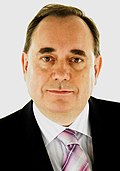This article needs additional citations for verification .(August 2014) |
1 May 1997 | |||||||||||||||||||||||||||||||||||||||||||||||||||||||||||||||||||||||||||||
All 72 Scottish seats to the House of Commons | |||||||||||||||||||||||||||||||||||||||||||||||||||||||||||||||||||||||||||||
|---|---|---|---|---|---|---|---|---|---|---|---|---|---|---|---|---|---|---|---|---|---|---|---|---|---|---|---|---|---|---|---|---|---|---|---|---|---|---|---|---|---|---|---|---|---|---|---|---|---|---|---|---|---|---|---|---|---|---|---|---|---|---|---|---|---|---|---|---|---|---|---|---|---|---|---|---|---|
| Turnout | 71.3%, | ||||||||||||||||||||||||||||||||||||||||||||||||||||||||||||||||||||||||||||
| |||||||||||||||||||||||||||||||||||||||||||||||||||||||||||||||||||||||||||||
 Coloured according to the winning party's vote share in each constituency | |||||||||||||||||||||||||||||||||||||||||||||||||||||||||||||||||||||||||||||
A general election was held in the United Kingdom on 1 May 1997 and all 72 seats in Scotland were contested. This would be the last UK general election to be contested in Scotland before the Scottish Parliament was established on 1 July 1999 following overwhelming public approval in a referendum.
Contents
- MPs
- Top target seats of the main parties
- Labour targets
- SNP targets
- Conservative targets
- Liberal Democrat targets
- Results
- Votes summary
- Outcome
- Notes
- References
The eleventh consecutive victory for Scottish Labour, this election gained notoriety for the fact that the Conservatives, led by then Prime Minister John Major, lost every single Scottish seat they had previously held, leaving no Conservative MPs from Scotland for the first time in British history.




